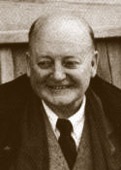Maurice Nicoll

Maurice Nicoll (1884–1953) was a psychiatrist, a leading exponent of Carl Jung. He was born at the Manse in Kelso, Scotland on 19 July, 1884. He studied Science at Cambridge University. Subsequently, he worked at St. Bartholomew’s Hospital in England, and then in Vienna, Berlin and Zurich. He became a colleague of Carl Gustav Jung and was greatly influenced by the latter in his work. He carried out medical service in the British army in Gallipoli and Mesopotamia during World War I, and then returned to England to continue his work as a psychiatrist. Nicoll met P.D. Ouspensky in 1921, and the latter influenced him the following year to go to the Prieuré to study with Gurdjieff. After Gurdjieff announced the dissolution of the Institute for the Harmonious Deevelopment of Man in 1923, Niccol returned to his practice in psychiatry in London, continuing his studies with Ouspensky until 1931. That year with Ouspensky’s permission he began teaching. Maurice Nicoll expanded on Ouspensky’s teachings of the Fourth Way, adapting it in a way to show his students the good results of the work, claiming the precedence of good over truth and equating Christ with Truth and Jesus with Good. In his teachings Nicoll showed an interest in Christian teachings, Neoplatonism and the interpretation of dreams, demonstrating the parallels between Gurdjieff’s and Ouspensky’s work with esoteric Christianity. Dr. Nicoll wrote a number of important works, which were initially not meant for publication. One of his most important books is Psychological Commentaries on the Teaching of Gurdjieff and Ouspensky, containing five volumes, which he gave to his study groups. He also wrote short-stories about his experiences in Mesopotamia under the pseudonym Martin Swayne. His final book, called The Mark, dealt with his reflections on the connection of the Work with the Gospels he died on 30 August 1953.
Links to Niccol’s book:





